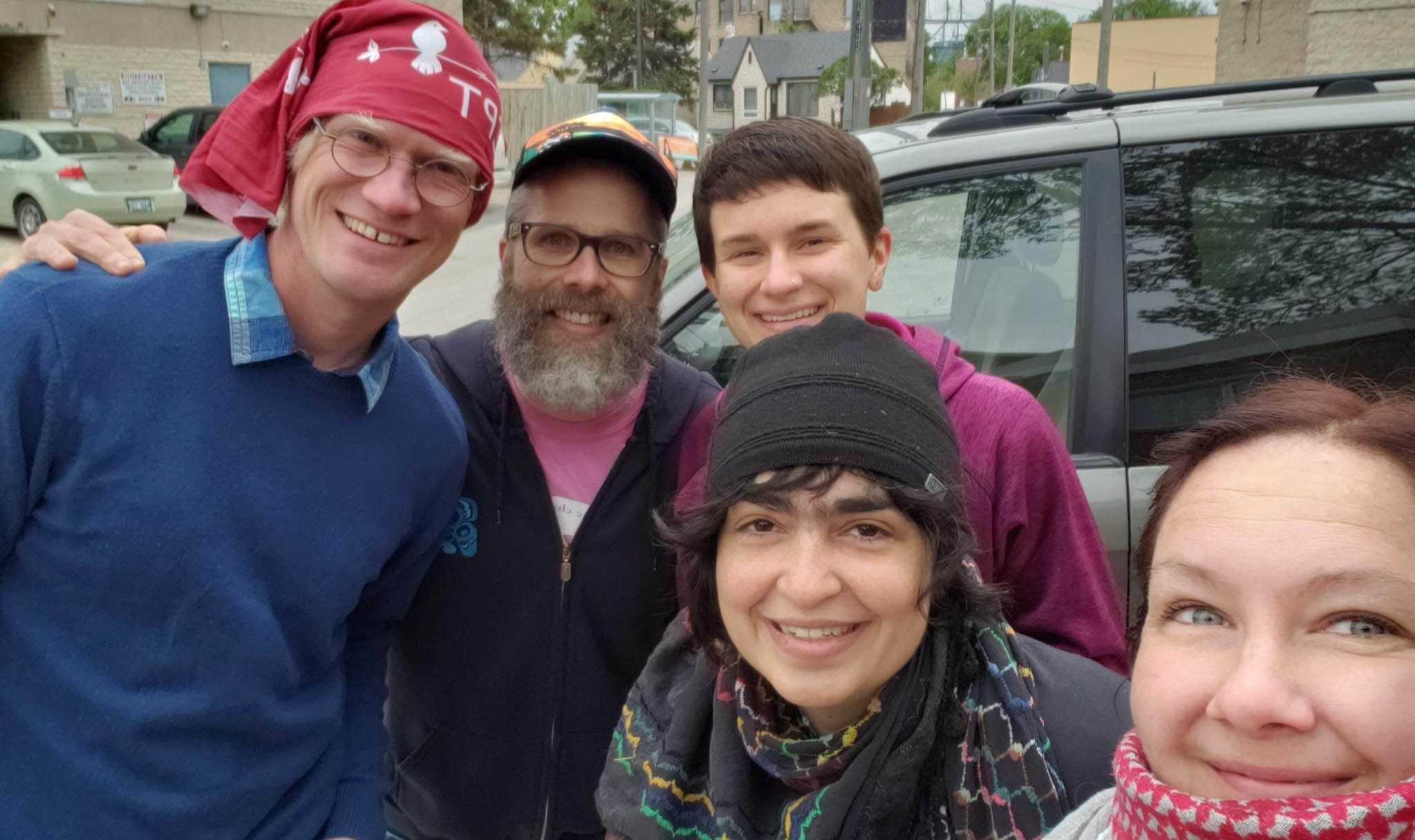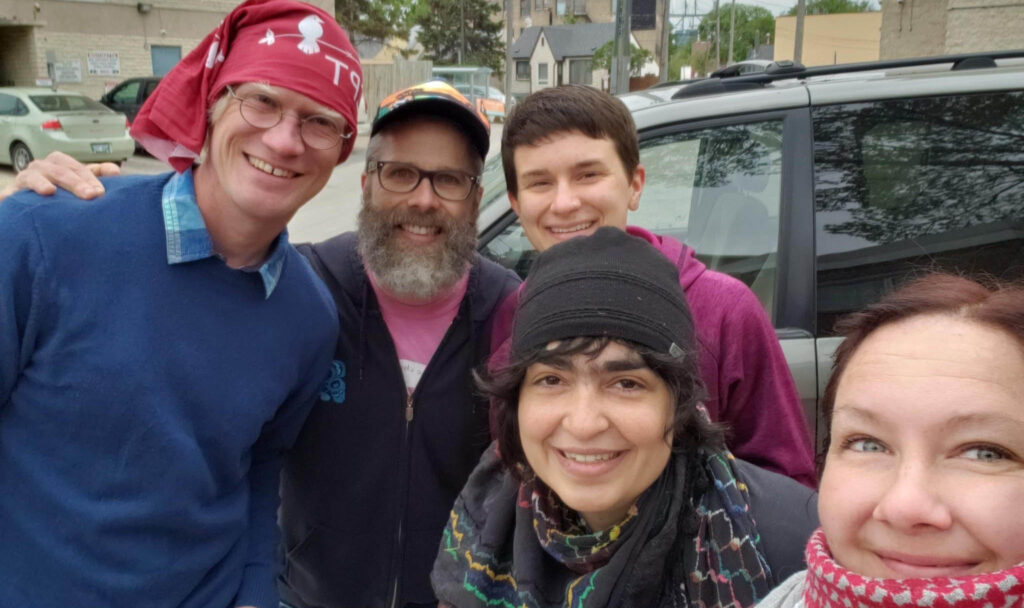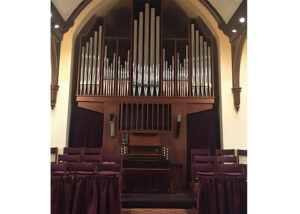Mennonite Church Canada, together with Christian Peacemaker Teams, has responded to an invitation to accompany Unist’ot’en Camp in Wet’suwet’en Territory. This past Friday, May 28, a group comprised of CPTers and members of MC Canada arrived at the camp in northern B.C.
The team members are:
- Rachelle Friesen, Canada Coordinator, Christian Peacemaker Teams;
- Allegra Friesen Epp, MC Canada-CPT intern and member of Home Street Mennonite Church (Winnipeg, Man.);
- Emily Green, CPT reservist;
- Steve Heinrichs, Director of Indigenous-Settler Relations, MC Canada;
- Josiah Neufeld, member of Hope Mennonite Church (Winnipeg, Man.).
The team released the following statement on May 28:
“While many communities and workplaces have been in a form of lockdown for over a year, the work of the Coastal GasLink Pipeline has not stopped. Settler colonialism and land theft continues. But so too does Indigenous resistance. Part of the resistance is the Unist’ot’en Healing Centre which nurtures connection to the land, cultural and spiritual wellness, and ensures Indigenous presence on sovereign territory. Five members of CPT and Mennonite Church Canada will be joining the site for approximately one month. Updates from the field will be limited, but we look forward to sharing our journey with you upon our return.”
With respect to COVID-19, the camp has protocols in place for risk reduction, and is taking risk seriously. The CPT-MC Canada accompaniment team has also put in place a strict COVID-19 protocol to minimize the risk of transmission. In addition, all members of this group have received their first vaccination.
During their stay, team members will learn from the people, listen to the land, and support the protection and maintenance of the Healing Centre, which, for more than 12 years, has nurtured connections to traditional territories and waters, cultural and spiritual wellness, and ensured Indigenous presence on sovereign territory.
Two of the team members, Allegra Friesen Epp and Emily Green, answered questions about the trip.
Q: Please describe your role on this trip and your relationship to MC Canada and CPT.
Friesen Epp: I am visiting Unist’ot’en as part of my internship with Mennonite Church Canada and Christian Peacemaker Teams’ Turtle Island Solidarity Network. Over the last number of months, I have been doing Indigenous solidarity work with both organizations. I also attend Home Street Mennonite Church in Winnipeg. I first became involved in CPT’s work on a delegation to Colombia in 2019.
Green: I am a reservist with CPT. This means that I have completed their one-month intensive training and I am available to work or volunteer with their projects. I am also a member of the Undoing Oppressions Working Group where we examine CPT policies and aspire to improve their anti-oppression practices.
Q: Tell us about where you’re travelling. Where is Unist’ot’ten and who lives there?
Friesen Epp: Our delegation is going to the Wet’suwet’en nation, which is located in what is now known as northwestern B.C. All 22,000 square kilometres of Wet’suwet’en territory remain unceded, which means that the Wet’suwet’en have never given up title to their lands.
The Unist’ot’en are one of five Wet’suwet’en clans. They established Unist’ot’en Camp in 2010 as a place of cultural resurgence and connection to their territory. We will be staying at this camp, which the Unist’ot’en maintain year-round.
Green: The territory is the site of a land defense struggle: the Wet’suwet’en people are resisting a pipeline project that would threaten their river and watershed—and their way of living and being. I am learning to appreciate my relationships with non-human life as just as real and important as my human relationships. The territory is inhabited by many living beings including bears, wolves, moose, elk and deer; there are also cedar, spruce, fir and many other species of tree.
Q: Why are you visiting this community?
Friesen Epp: Our delegation is responding to Unist’ot’en’s request for on-the-ground support. It is essential that, as settlers, we embody our solidarity and take seriously the invitation to be present on the frontlines. Christ paid particular attention to those who were being oppressed by the colonial powers of his time. As a Christian, I believe I am called to do the same.
Green: I had the honour of visiting just over a year ago, before the pandemic. I’m hopeful that I will reconnect with old friends and make new friends. Relationship-building is foundational to settler-Indigenous solidarity. It gives me life to envision a decolonized world and it gives me hope to engage in Indigenous-led strategies to build that world.
Q: What will you do when you are there?
Friesen Epp: We will take direction from the Unist’ot’en leadership and lend a hand wherever needed. This might include chopping firewood, washing dishes or documenting human-rights violations. We intend to do lots of listening and learning as guests on Wet’suwet’en territory.
Green: I’ll do what is needed: cooking large meals, helping with construction projects or any number of other tasks. Our accompaniment group has plans to read about settler-Indigenous solidarity and to learn together.
Q: How can we learn more about this community and support the work that you’re doing?
Friesen Epp: There are several great videos on the Unist’ot’en Camp website that beautifully illustrate the values and vision of the community. This three-minute video describes the Healing Centre at Unist’ot’en, which provides the community with cultural programming and land-based teachings.
The Unist’ot’en need financial support. Donations made here go towards legal costs associated with the Unist’ot’en’s ongoing protection of their lands, rights and way of life.
Green: For a short, 20-minute background on the struggle, I recommend watching the video Invasion.









Leave a Reply
You must be logged in to post a comment.